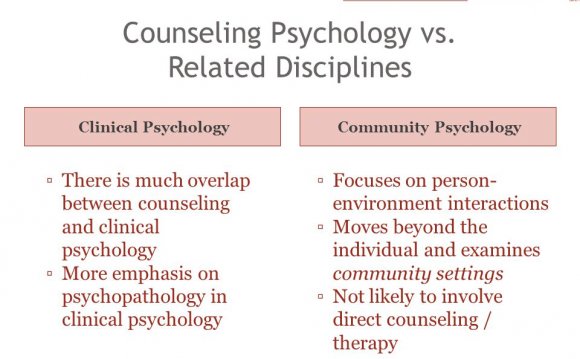
 For many people, the difference between a clinical psychologists and a counseling psychologist is confusing, but with some explanation, it’s very easy to discern the two. If you’re interested in studying psychology though, then it’s important to know the difference between the two.
For many people, the difference between a clinical psychologists and a counseling psychologist is confusing, but with some explanation, it’s very easy to discern the two. If you’re interested in studying psychology though, then it’s important to know the difference between the two.
Typically the two professions perform similar work as both researchers and practitioners. Additionally, individuals from both sides often work together in a number of settings, such as academic institutions, hospitals, mental health centers, community centers, independent practices, college counseling centers, or more. Yet the two professions do perform slightly different tasks in the psychology field, all of which are worth noting:
Clinical Psychologists
Clinical practice usually refers to the care, diagnosis, and treatment of someone who has mental illness, abnormal behavior, emotional or behavioral disorders, or psychiatric problems. Many clinical psychologists use a variety of psychology approaches depending on the person’s issue. Clinical psychology can be used in individual, family, or group therapy sessions. Clinical psychologists also design behavior modification programs and help patients implement their particular program towards their desired goals.
Counseling Psychologists
Counselors consult, advise, or deliberate with patients. According to The Bureau of Labor Statistics, a counseling psychologists helps “patients understand their problems, including issues in the home, workplace, or community.” As a counselor you would hold a session with a patient and help identify their strengths and resources they can use to manage their unique issues. Counseling psychologists are integral to helping individuals work through problems in a variety of settings and the position requires an ability to adapt quickly scenarios that can present themselves when bringing individuals together. Counseling psychologists many times possess a much more innate ability to get other comfortable and create an environment intuitive to opening up and work through issues. It’s a skill that can’t be overstated in its importance because of how hesitant people can be to discussing issues with others not directly involved.
Education for Clinical and Counseling Psychologists
A Ph.D. requires research, a comprehensive exam, and a dissertation based on the research. Often counselors get a Ph.D. in psychology, as it requires a 1-year internship of practical experience within a counseling setting. By no means is this an easy feat. Many people who attain a Ph.D. in psychology regard it as a crowning achievement in their life, not because it’s the most important accomplishment they’ll ever make, but because it enables them to engage in the most important accomplishments they’ll ever make- helping others. If this is something that sounds appealing and you truly think you have the capacity to commit yourself to the large undertaking of it, you’ll be well on the path to touching countless lives through your work.
The Psy.D. degree is usually what clinical psychologists obtain. It’s based on practical work and examinations rather than a final dissertation. The real-life experience attained is what solidifies credentials needed to aptly address the concerns and needs of others.
Licensure of Counseling and Clinical Psychologists
In most states, practicing psychology or using the title of “psychologist” requires licensure or certification. Therefore, as both a counselor and clinical psychologist, you must look into becoming certified.
Share this Post
INTERESTING PSYCHOLOGY VIDEO













